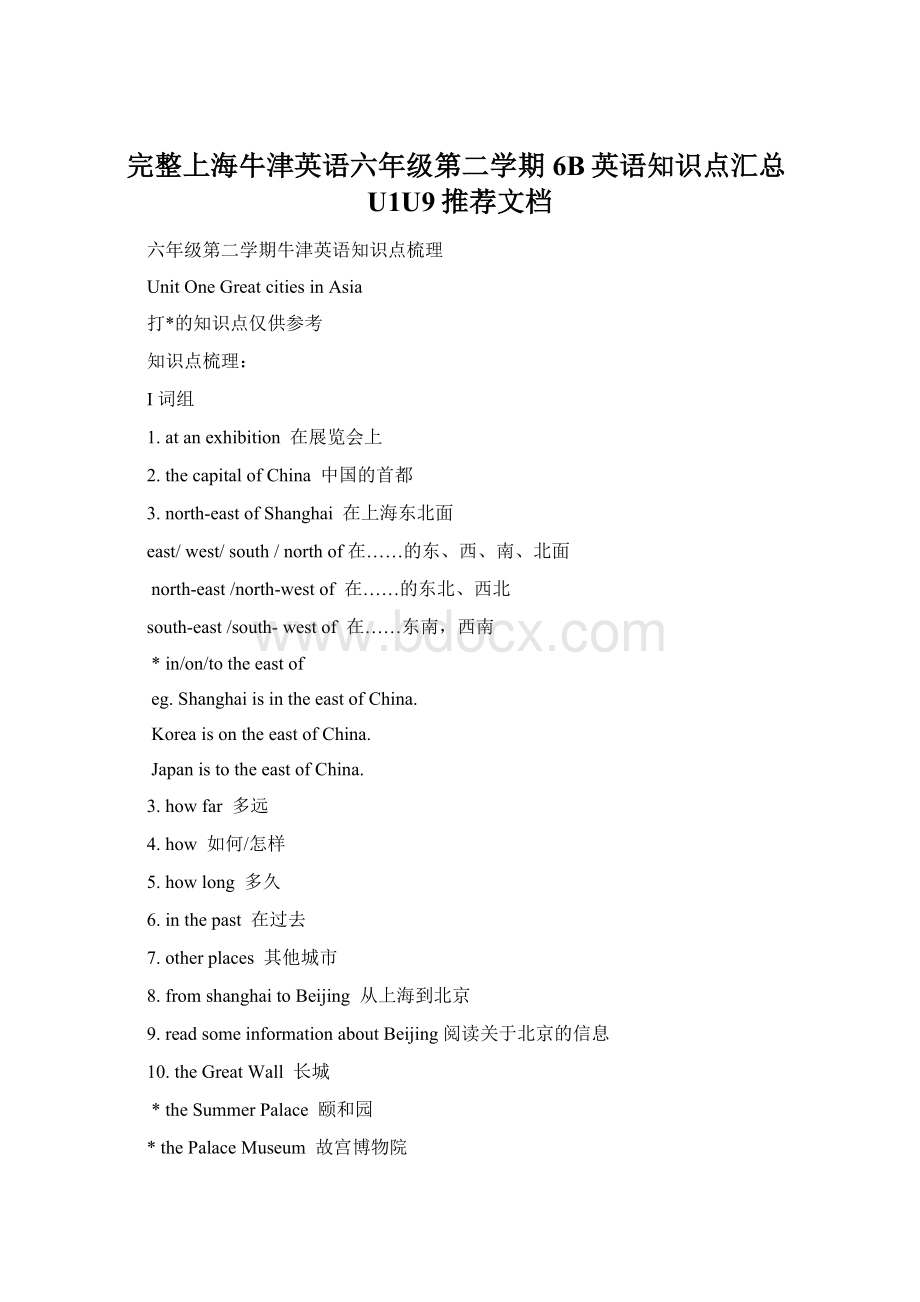完整上海牛津英语六年级第二学期6B英语知识点汇总U1U9推荐文档Word格式.docx
《完整上海牛津英语六年级第二学期6B英语知识点汇总U1U9推荐文档Word格式.docx》由会员分享,可在线阅读,更多相关《完整上海牛津英语六年级第二学期6B英语知识点汇总U1U9推荐文档Word格式.docx(40页珍藏版)》请在冰豆网上搜索。

乘飞机
byship=bysea;
乘船
bytrain/ferry乘火车/渡轮
19.That’sright.对的。
*That’sallright.没关系,不要紧。
20.twodaysandahalf=twoandahalfdays两天半
21.likevisitingthoseplaces喜欢参观那些地方
like/love/enjoy/doingSth.
wouldliketodoSth.
22.inTokyo在东京
II.词性转换
1.Japan(n.)日本—Japanese(a./n.)日本的,日语,日本人
aJapanese,someJapanese
MyunclemetsomeJapanesevisitorsyesterday.TheycamefromJapan.
China(n.)中国–Chinese(a./n.)中国的,汉语,中国人
aChinese,alotofChinese
ChinaisagreatnationwithmillionsofcleverandbraveChinese.
2.Thailand(n.)泰国—*Thai(a./n)泰国的,泰语,泰国人
ThatThairestaurantislookingforagoodfromThailand.
3.exhibition(n.)展览会,展览—*exhibit(v.)
TheShanghaiExhibitionCentreisonYan’anRoad.
4.build(v.)建造--building(n.)建筑物–*builder(n.)建筑工
Thousandsofbuildershaveworkedhardtobuildsuchawonderfulbuilding.
5.tourist(n.)游客—tour(n.)旅游
Thosetouristsarewelcomedbylocaltouragency.
6.information(Uncountablenoun)
*apieceofinformationsomeinformation
SamandAndyarelookingforsomeinformationaboutforests.
III.语言点/句型
1.south-east(东南),north-east(东北)south-west(西南),north-west(西北)这些斜方向方位词与中文表述相反。
2.eastof在(…范围外面的)的东面
intheeastof在(…范围内)的东面.
eg.TokyoiseastofShanghai.ShanghaiisintheeastofChina.
BeijingisnorthofShanghai.ItisalsointhenorthofChina.
3.thecapitalofChina中国的首都
of的两种含义
(a)of表示“的”
thecapitalofChina/themapofmyschool/thepictureofme
of表示”在…之中”(后用复数)
one/some/many/all/noneoftheboys.
eg.BeijingisthecapitalofChinaanditisalsooneofthegreatcitiesinAsia.
4.That’sright那是对的
That’sallright没关系
Youareright你是对的
Allright好吧
eg.A:
TokyoisthecapitalofJapan---------B:
That’sright./Youareright.
A:
Iamsorry.--------------B:
That’sallright.
Pleaseopenthedoor----B:
Allright.
6:
关于“半个的表达法”
halfanhour(半小时)
onehourandahalf(一个半小时)
anhourandahalf
oneandahalfhours(注意复数)
两天半twodaysandahalf
twoandahalfdays.
eg.ittakesabouttwoandahalfhourstoflyfromShanghaitoBeijing.
7.byair=byplane乘飞机:
bysea=byship乘船
eg.TomorrowIwilltraveltoBeijingbyair,.
注意同意表达
go/travel/getto…by…==takea/an…to
eg.Hegoestoschoolbycar.
Hetakesacartoschool.
8.how,howfar,howlong的特殊疑问句
howfar---“多远”问距离
Itisabout1,400kilometers.Howfarisit?
how----“如何,怎样”(1.by+交通工具2.作表语的形容词)
Igotoschoolbybus.Howdoyougotoschool?
Hebecamefitagain.Howdidhebecome?
howlong“多长时间”(对时间段提问)
*初中阶段用howlong的常见句型
-Ittakessbtimetodosth
-since+时刻点或从句
-for+段时间
-不带not的until
eg.1.Ittakesmeabout2hourstogetthere.
Howlongdoesittaketogetthere?
2.Ihavelivedheresincelastyear.
Howlonghaveyoulivedhere?
3.Ihavelivedherefor2years.
4.Ididmyhomeworkuntilmid-night.
Howlongdidyoudoyourhomework?
*5.(Iwon’tgotobeduntilIfinishmyhomework.)
Whenwillyougotobed?
9morethan超过==over
eg.Therearemorethan12millionpeopleinShanghai.
Thereareover12millionpeopleinShanghai.
10.15million一千五百万
millionsof数以百万
eg.Morethan70millionpeoplevisitedShanghaiExpoandmillionsofthemvisitedChinaPavilion.
11like/love/enjoy后跟动词ing
PeopleinTokyoenjoyeatingsushi.
like/lovedoingsth=like/lovetodosth
12therebe句型表示某地方或者某时间有…
eg.Thereare15millionpeopleinBeijing.
Therewillbemuchrainnextmonth
注意therebe句型的各种时态
Therewas/were(过去时)
Therewillbe/isgoingtobe(将来时)
Therehave/hasbeen(完成时)
eg.TherehavebeenalotofpeopleinShanghaialreadyandtherewillbemoreinthefuture.
13.TheseareallgreatcitiesinAsia.
all“(三者以上)所有”,放在be动词后,行为动词前。
eg.Tokyo,BangkokandBeijingallcomefromAsiaandtheyareallmyfavouritecities
Module1Citylife
Unit2Attheairport
(打*的知识点仅供参考)
I词组:
1.arriveattheairport到达机场
2.arriveinLosAngeles到达洛杉矶
3.arrivehome/here/there到家/这儿/那儿
4.asilkscarf一条丝巾=>
severalsilkscarves几条丝巾
5.plentyofspace大量的空间
6.departuretime起飞时间
arrivaltime抵达时间
7.oneandahalfhours=one/anhourandahalf一个半小时
8.beforeoneo’clock一点之前
9.havetodosth.不得不做某事
10.drivesomebodytosomeplace开车送某人去某地
11.leaveA离开A地/
leaveforB出发去B地
leaveAforB离开A地去B地
12.overthere在那里
13.aboardingcard一张登机牌
14.anametag一张姓名牌
15.writedown写下
16.liveinLosAngeles住在洛杉矶
17.enoughspace足够的空间
18.bigenough足够的大
19.toomanysweets太多的糖果
20.toomuchmeat太多的肉
21.oneandahalfhours=onehourandahalf一个半小时
22.buysb.sth.=buysth.forsb.为某人买某物
II.词性转换:
1.flyv.飞,飞行→flightn.航班
e.g.Nextmonth,theywillflytotheUSA.TheirFlightNo.isMU6789.
2.departv.离开,出发→departuren.离开,启程
e.g.Ourparentswilldeparttomorrowmorning.Thedeparturetimeis9.00a.m.
3.passv.通过→passengern.乘客;
旅客
e.g.Youcan’tpass.Stop,please!
Allpassengersmustobeytherules.
4.trolleyn.手推车→(复)trolleys
5.arrivev.到达→arrivaln.到达
e.g.Thearriveltimeis3.00p.m.,sotheywon’tarriveat1.00p.m.
*1.AuntJudyandUncleMikehavelivedinLosAngelesforsixyears.
1现在完成时:
sb.have/has+V.p.p(动词的过去分词)
Sb.have/hasnotV.p.p.(否定句)
Have/Hassb.V.p.p.(一般疑问句)
2havebeento去过,到过……(已回)
havebeenin住在……(+时间段)
havegoneto去,到……(未回)
e.g.IhavebeentoAmericabefore.我以前去过美国。
ShehasbeeninLondonfor2years.她已经住在伦敦两年。
WhereisMary?
Shehasgonetothelibrary.Mary在哪?
她已经去图书馆了。
3Theyhavealreadydonealotofthings.
Tomhasn’treadthatbookyet.
Haveyoucheckedyourpassportyet?
“already”意为“已经”,用于现在完成时肯定句
“yet”意为“还,已经,仍”,用于否定句和疑问句。
4V.p.p.动词的过去分词:
bring—brought—broughtget—got—gotwrite—wrote—written
buy—bought—boughtput—put—putpack—packed—packed
live—lived—liveddo—did—done
2.MrsWangandGrandmaaregoingtoLosAngels,theUSA,thisSundaytoseeAuntJudyandUncleMike.
本例中使用了现在进行时表示“将来”的含义。
这样的动词常常是:
go,come,leave,moveetc.
e.g.Iamleavingnow.我要离开了。
Thebusiscoming.Hurry!
公交来了,快点。
*3.GrandmahasboughtAuntJudyplentyofT-shirtsandseveralsilkscarves.
buysb.sth.=buysth.forsb.
e.g.原句可以表述为:
GrandmahasboughtplentyofT-shirtsandseveralsilkscarvesforAuntJudy.
4.However,theyhavenotpackedtheirsuitcasesyet.
however:
可用于句首,句中,句末,前后常用“,”隔开,语气比but弱。
but:
用于句中
e.g.Shewasill,however,shestillwenttowork.
Shewasill,butshestillwenttowork.
5.WhattimedoesyourplaneleaveforLosAngelestomorrow?
leavesp.离开某地
leaveforsp.出发去某地
e.g.TheywillleaveShanghai.他们将离开上海。
TheywillleaveforTokyo.他们将出发去东京。
Module1Unit3词组语法整理
1
端午节
theDragonBoatFestival
18
一只甜粽子
asweetricedumpling
2
跳进河里
jumpedintoariver
19
有肉的咸粽子
saltyricedumplingswithmeat
3
国家处于危险中
thecountrywasindanger
20
没有豆的甜粽子
sweetricedumplingswithoutbeans
4
在每年的那天纪念他
rememberhimonthatdayeveryyear
21
我们最喜欢的粽子
ourfavouritericedumplings
5
他的工作是给皇帝建议。
Hisjobwastogiveadvicetotheking.
22
你想吃点粽子吗?
Wouldyoulikesomericedumplings
6
举行龙舟比赛
havedragonboatraces
23
好的,请。
Yes,please.
7
吃粽子
eatricedumplings
24
不用,谢谢。
No,thanks.
8
那年农历五月初五
thefifthdayofthefifthlunarmonthofthatyear
25
我宁愿吃一片披萨
I’dratherhaveapieceofpizza.
9
一个粽子
aricedumpling
26
一些布丁
somepuddings
10
战争失败
loseabattle
27
一片饼干
apieceofbiscuits
11
采纳他的意见
takehisadvice
28
一些三明治
somesandwiches
12
新皇帝不听他的
thenewkinddidnotlistentohim
29
给你的外国朋友写一封电子邮件
writeane-mailtoyourforeignfriend
13
出生在大约两千年前
was/werebornabouttwothousandyearsago
30
告诉你一些关于……的事情
tellyousomethingabout
14
为什么人们要庆祝它?
whydopeoplecelebrateit?
31
我爱拍照
Ilovetakingphotos
15
以下是这个节日的故事
here’sthestoryofthefestival
32
拍一些……的照片
takesomephotosof…
16
知道关于端午节的情况
knowsomethingabouttheDragonBoatFestival
33
我将会送给你一些……
Iwillsendyousome
17
一只咸粽子
asaltyricedumpling
34
两种粽子
twokindsofricedumplings
语法重点:
1.一般过去时:
a.概念:
表示过去发生的动作或存在的状态。
b.常用的时间状语:
yesterday,lastweek/year…,inthepast,…ago,in2005,justnow…
c.结构:
主语+动词的过去式+…
e.g.HewatchedTVyesterdayevening.否定:
Hedidn’twatchTVyesterdayevening.
d.动词过去式的构成:
规则变化:
1)一般情况下在动词词尾直接加-ed.e.g.jump——jumped;
2)以不发音的e结尾的动词直接加-d.e.g.love——loved
3)以辅音字母加y结尾的动词,去y变i+ed;
e.g.study——studied
4)以重读闭音节结尾,且词尾只有一个辅音字母的动词,双写最后一个辅音字母,
再加-ed.e.g.stop——stopped
不规则变化:
参见教材P103
2.词性转换
●celebratev.庆祝*celebrationn.庆祝
●(be)bornv.出生bearv.生
⏹e.g.AlicewasborninLondonin2005.
●countryn..国家;
乡下countrysiden.郊外,郊野
●advicen..劝告;
忠告advisev.劝告,忠告,建议
●sadadj.悲伤的sadlyadv.悲伤地sadnessn.伤心,难过
●diev.死;
死亡deadadj.死的deathn.死亡
●lateradv.以后;
后来l